- Home
- Barry Unsworth
Losing Nelson Page 4
Losing Nelson Read online
Page 4
“You are quite a Sherlock Holmes,” I said. “Female version, I mean.” I realized now, as I looked down at her, that Miss Lily had been tested back there in my study, that she had passed, and that her success had changed things between us.
4
After Miss Lily had gone I found in the fridge a covered dish that proved on investigation to contain ravioli with a filling of spinach and cream cheese, which I then remembered buying at a delicatessen near Chalk Farm station two, or perhaps three, days earlier. I sniffed it but could detect no trace of taint. Cold from the fridge like that, it didn’t taste of anything much. I washed it down with some claret, about half a bottle, all I had left.
After the various upsets of the day I felt exhausted, but I had no inclination to sleep, in spite of the wine. I returned to my study and began to leaf through the loose pages of my manuscript, coming soon—as invariably happened in those days—to Horatio’s fateful arrival at Naples in September 1798 and subsequent events, in particular those of the following June, from the tenth to the thirtieth. I was enmeshed in those twenty summer days.
The preliminary events are not in dispute. I knew them by heart, without needing to look at the pages before me. Horatio arrives in Naples on September 22, some two months after his resounding victory over the French at the Battle of the Nile. He is given a hero’s welcome by King Ferdinand, the Bourbon ruler of the Two Sicilies, and his queen, Maria Carolina, who regard him as their saviour. They are terrified of the French, and with reason—Queen Marie Antoinette, Maria Carolina’s sister, was guillotined in Paris five years previously. Horatio, though gratified by his reception, is far from well. He is still suffering from battle stress and the effects of a bad head wound received during the action. He needs rest and nursing, and this is provided by Lady Hamilton, the wife of the British ambassador to Naples, Sir William Hamilton, connoisseur and collector, thirty-five years her senior.
The danger of a French invasion by land is not over; in fact, it grows daily greater. Their armies have occupied northern and central Italy; they have taken Rome, expelled the pope, and declared the city a republic. There is a treaty in existence between France and the Kingdom of the Two Sicilies. However, from Rome to Naples is only a few days’ march, too close for comfort. Horatio, supported by the queen, urges the irresolute Ferdinand to assume command of the Neapolitan army and march on Rome as defender of the faith against the atheist French. After much hesitation, he is prevailed upon to do so. At the head of thirty thousand troops, under the direction of the Bavarian general Baron Karl Mack von Leiberich, he sets off.
What an army. Described by Mack as the finest in Europe, it consists mainly of peasants in uniform, with an admixture of bandits and released convicts. Mack himself proves both obstinate and hesitant, not the best of combinations in a general. The king shares with his soldiers a strong distaste for personal risk.
At first there are successes. The French withdraw to concentrate their forces. Rome is recovered; Ferdinand rides in triumph through the streets, mounted on a white horse, accompanied by dragoons in glittering uniform. But then comes the counterattack. The Neapolitans break and run, both officers and men; Mack conducts a disorderly retreat; the king bolts back to Naples in civilian disguise, groaning with fear, beseeching his aides not to desert him.
Horatio, it has to be said that your advice was disastrous. The king is humiliated, Naples is left defenceless, the French have been given a pretext for breaking the treaty. The Kingdom of the Two Sicilies will be plunged into civil war, the royal family obliged to quit the mainland and flee to Palermo in order to avoid falling into the hands of the French.
Not Horatio’s fault, of course. I was intent on making that absolutely clear in my book. Other biographers have called it a blunder, but this is to misunderstand completely his character and temperament. Attack came naturally to him; he was all fire. How could a man so noble of soul comprehend the baseness of his instruments—a king who had nothing of the kingly, a commander who could not command, an army that melted away?
He is now all that stands between the royal family and the advancing French. The ships are ready to embark the monarchs if need be. He has already vowed British support to the queen; now he is drawn into a personal promise not to desert her. A very different thing … I had noted the reference, it was there on the page before me, taken from a letter to his wife, Fanny, dated December 11, 1798: The poor Queen has again made me promise not to quit her or her family until brighter prospects appear than do at present.
This promise was troubling to me. Why did you make it? Why did you tie yourself down in that way? Your orders from the Admiralty were to protect the whole Adriatic coast as well as those of Naples and Sicily and to supervise the blockade of Malta, then in French hands.
Ten days later the situation has become impossible. The French are approaching Naples, and many will welcome them with open arms—the educated classes, the liberal aristocracy, united in their hatred of Bourbon cruelty and oppression, ardently possessed with the spirit of reform and republican ideas.
On the night of the twenty-first of December, the royal family is embarked, together with the Hamiltons and various Neapolitan notables. Bad weather prevents them from sailing until the twenty-third. At two on the morning of Boxing Day they anchor at Palermo. It is here, in the following February, that Horatio and Emma become lovers. And it is here that the news is received from Naples that the French army has taken the city, aided by the Neapolitan republicans, crushing an uprising of the lazzaroni, the fearsome Naples mob, who are devoted to their king and queen. The royalist forces have been expelled from the castles of Sant’Elmo, Nuovo, and dell’Ovo, and a republic, known as the Parthenopean Republic, has been set up.
Meanwhile, King Ferdinand is approached in Palermo by Cardinal Fabrizio Ruffo, a warrior cleric of ancient lineage, who offers to go to Calabria, where his family’s estates are, appeal to the patriotism and religious faith of the peasantry, and lead them in a holy war to recover Naples for the monarchy. The offer is accepted. Ruffo enlists a force of Calabrese irregulars, murderous, ill disciplined, avid for loot. Holding this horde by force of personality under precarious control, he marches on Naples.
This Christian Army of the Holy Faith, as Ruffo calls it, has astonishingly rapid success. By the end of May the French have been forced to withdraw, leaving only a garrison in the castle of Sant’Elmo to support the Neapolitan republican militia—patriots, as they regard themselves; traitors, as Horatio regards them—who now take refuge from the bloodthirsty vengeance of the lazzaroni in the fortified castles of Nuovo and dell’Ovo.
So far, so bad. I took up my papers again. We were approaching the last week of June, the days that were causing me so much perplexity. By now Naples is in chaos. Ruffo’s troops are out of control, plundering, raping, and killing unchecked. Mobs of lazzaroni are roaming the streets, murdering and mutilating anyone, man or woman, suspected of Jacobin sympathies. For the details of this terrible period I was mainly relying on the account of Constance Giglioli, who quotes an eyewitness, Giuseppe di Lorenzo. I glanced over his words now in the calm of my study, which, however, still seemed to have something of Miss Lily’s argumentative presence in it. Heads and mutilated limbs were scattered in the street corners … A great number of victims were shot, one after the other … This done those butchers, not caring whether they were alive or dead, proceeded to cut off their heads, some of them were borne in procession on the ends of long poles and others served them to play with, rolling them along the ground like balls.
It is to avoid an indefinite continuation of this bloodshed that Cardinal Ruffo, on June 23, makes terms with the enemy. He accepts the surrender of the French garrison and their Neapolitan allies in the city’s forts. The French will be shipped home, the Neapolitans given the option of accompanying them or returning to their homes under a general amnesty. The treaty is also signed, in the name of His Britannic Majesty George III, by the senior British officer in Naples, a certain
Captain Foote, Horatio having sailed to the west coast of Sicily in an attempt to intercept the French fleet. The other cosignatories are Baillie and Achmet, for Russia and Turkey, respectively.
A regular treaty then, signed by accredited representatives of all the forces opposed to the French. Horatio, when he hears of it on the twenty-fourth, is violently opposed, not to the terms offered the French but to an amnesty for the Neapolitan Jacobins. There are heated arguments. The cardinal has given his word; the treaty must be honoured. For Horatio the republicans are vile traitors who have supported an invading force. They must surrender unconditionally and throw themselves on the royal mercy.
Could they have had any faith in this? Surely they must have known what to expect. Maria Carolina was frightened and ferocious; Ferdinand’s vindictiveness was notorious. Yet on the afternoon of the twenty-sixth, the rebels came out of their forts. The fate that befell them was predictably atrocious.
So why did they do it? In this question lay all my trouble. It was as far from solution that February night as it had been when I first stumbled on it three months before. Until I found an answer, an acceptable answer, I could not proceed. I had been over the events hour by hour, as far as I had been able to find reliable authority for them, especially the forty-eight hours between Horatio’s arrival in Naples and the rebels’ quitting of the forts. I had puzzled so long and so earnestly that it had all gathered to a sort of bruise in my mind; touched even gently, it would throb and hurt me, driving me always to seek refuge in the less ambiguous triumphs of his career.
Refuge I found now, as I sat there, in thoughts of his splendid arrival in the city just ten months before, the conqueror, still a seabeing, still untouched by this corrupt and sensual place. Already, off Stromboli, in early September, his squadron has been joined by the Mutine, bringing from Naples the first letters of congratulation on his victory. Sir John Acton, the prime minister of Naples, expresses the felicitations of Ferdinand and Maria Carolina addressed to the Saviour of Europe. Sir William Hamilton, on behalf of himself and his wife, Emma, addresses him as “bosom friend.” You have now made yourself, my dear Nelson, immortal. In fact, the acquaintance at that point was slight; they had met briefly five years previously, when Horatio was a young captain, still whole and unmutilated. Since then there had been Corsica and the blinding of his right eye, there had been his exploits at Cape St. Vincent, the fiasco of Tenerife and the loss of his right arm. Now this astounding victory at Aboukir Bay.
In the same batch of letters are two from Emma. All of Naples is mad with joy, she is walking on air with pride at having been born in the same land as he, she is dressed from head to foot alla Nelson—even her shawl has blue-and-gold anchors all over it. She urges him to write or come soon. He has written already, expressing the hope that his mutilations will not make him the less welcome.
The British ships are sighted at dawn on September 22 off the island of Capri. A Saturday. I had then never looked across that most famous of bays, but I had imagined it often, that dawn advent of the hero, that slow approach to the jubilant city … I knew what it would have been like to see it from the quayside, the faint sails in the half-light, now seen, now lost, drawing nearer as the light strengthens, silhouetted against the tawny cliffs of the island. Then sunrise, a single track of flame across the expanse of pale water …
Ten o’clock. The bay is a platter brimming with sunlight. Hundreds of pleasure boats have put off from the shore. I see their sails and hulls reflected in the water, shades of blue, scarlet, dark orange. The boats make ripples in the surface, but to my mind there is no gash of white; it is as if the colours themselves have power to cleave the water. Bands of musicians have come out to meet the ships. The orchestra of the San Carlo Opera, in a barge strung with red, white, and blue bunting from stem to stern, plays “God Save the King” and “Rule Britannia” and “See the Conquering Hero Comes.” The martial strains resound across the bay and carry to the approaching ships. The Vanguard responds with the boom of cannon.
The quayside is thronged with cheering people. We stand there at the prow. Tier upon tier of houses rise above us, pale yellow, rose pink, parchment colour, terracotta, rising into sun-hazed darker slopes of cypress and ilex. The balconies of the houses are festooned with flags, hung with baskets of carnations and roses. The ambassador’s barge comes out to us, greeted by a salute of thirteen guns. It draws alongside. Lady Hamilton, all dressed alla Nelson, flies up the ladderway. One of the most beautiful women of her time. She exclaims, “Oh, God, is it possible?” She faints in my arm and falls to the deck.
A left-handed handshake from Hamilton; elderly, thin, distinguished. His words are not recorded. An hour later a further salute, twenty-one guns this time. Ferdinand I, ruler of the Two Sicilies, is approaching in his state galley, painted scarlet and gold, with spangled awnings. Some months away still the fiasco of his expedition, the ignominious flight. Perspiring in his black velvet and gold lace, he makes a speech of welcome. There is gratitude in that big-nosed face as he hails his “Deliverer and Preserver.”
As the Vanguard moves in stately fashion towards the waiting city, we sit down to an elegant breakfast. Among the illustrious guests is Commodore Caracciolo, Bailli of the Order of Malta, admiral of the Neapolitan navy, who is in charge of the nautical education of the king’s nine-year-old son, Leopold. He is only a few months away from court-martial and death at our hands by public hanging as a traitor to his king.
As we step onshore, the air is full of fluttering wings. Hundreds of fishermen with captive doves in wicker cages have been standing at the quayside, waiting for just this moment. They raise the cages aloft, release their captives. As the white birds mount upwards, I try to follow their flight, but my eyes are dazzled by the brightness of the sky, the sunlight hazed with dust, the rain of petals. I am confused by the music and the shouting of the people. We gain our waiting carriage and go clattering away over the black lava paving stones, up towards the British Embassy, Palazzo Sessa, whose façade is draped with red, white, and blue hangings.
Something brought me back from this, perhaps some sound outside. Sitting there in the calm light of my study, my eyes felt this daze, this bewildering assault of sunlight and movement. Half involuntarily, I glanced up at the ceiling, as if to follow those beating wings, those floating petals. But there was only the Victorian stucco, crumbling here and there, of the cornice. Has any man before or since, any conquering hero whatever, made such a triumphant appearance in such a magnificent setting?
I doubt it, really I doubt it. In the carriage clattering up to the embassy, there is not much talk. Fascinating to my mind, that short journey. The whole situation, all that was to happen, already contained there, in the words and glances. Four people in close proximity: Horatio, Sir William and Lady Hamilton, and Miss Cornelia Knight, the authoress, who had accompanied the Hamiltons in their barge and was to relate the details of this historic meeting in her autobiography. Three principals, then. First—always first—the hero, still sick, suffering from the prolonged anxiety of that long pursuit and the stress of the nighttime battle in the hazardous shallows at the mouth of the Nile, lonely, in need of comfort, in need of the mother we lost so young; Emma, the blacksmith’s daughter, exuberant, beautiful, excessive, ridden by follies, full of admiration for him, experienced in love; Sir William, aristocratic, cultivated, world-weary, aware of declining powers, prepared if need be (though perhaps not knowing it yet) to lend his wife or even give her, as she had been given by his nephew to him.
So we go clattering uphill in our open carriage, leaving the pleasure boats and the white birds and the thronged quayside behind us, up to the Hamilton residence, easily recognizable at a distance by those vivid hangings of scarlet, white, and blue. After arriving, some hours of repose. While we are resting, darkness falls. The three thousand lamps that have been set in the façade of the palazzo all spring to life, and the words “Nelson of the Nile” blaze out over the city.
We take our p
laces at the dinner table. A distinguished gathering. Among the blue uniforms are those of Troubridge and Ball, constant companions of those Naples days. Your two favourite captains. It was they who carried the note to Ruffo that June morning the following year, the note that seemed to promise so much, that brought the Jacobins out of their forts. Your note. I didn’t want to think about this; I wanted to hold on to the scene of our triumph, there in the candlelight, honoured guest, perhaps unsettled by the steadiness of things after so long at sea, perhaps confused by the beauty of fullbodied Emma and the slimmer versions of her that looked down from the walls in a multitude of guises and postures, copies acquired by Sir William before the original was securely his: teenage rosebud Emma in a black hat and pink silk gown; Emma as a bacchante, auburn tresses in artful disarray, flimsy draperies loose about her; Emma as Saint Cecilia, robed in white, palms closed in prayer, eyes looking heavenwards.
Your eyes were bombarded with Emma. Tired eyes, but not too tired to be beguiled. Were there glances already? Was there already something you wanted to repress or deny? Is that why you said you preferred Emma as a saint? Is that why you found occasion to say, with emphasis, there at the table, that the happiest day of your life was not the victory at the Nile but the day you married Lady Nelson?
Your room was on the upper floor. It had a broad semicircular window looking southwards over the bay towards Capri. The entire opposite wall was covered with mirrors. You could see the pale disc of the moon rise from the fiery mouth of the volcano as if exhaled upwards. Below, on the silver water, the ruddy torchlights of the small boats, fishing for tuna. And all this again, this blending of ruddy and pale, reflected in every detail in the glass of the wall. And when, in the days of your sickness, the hot September afternoons when you were feverish and she came to tend you, to see to your comfort, as she moved about the bedside you would see the lines of her body through the light summer clothes. And every movement, the turn of her shoulders, the sway of her hips, would be reflected in the glass. Repeated reflections like a repeated caress. Sweetness of the loins under the bedclothes …

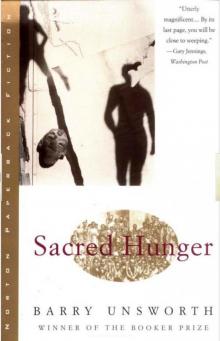 Sacred Hunger
Sacred Hunger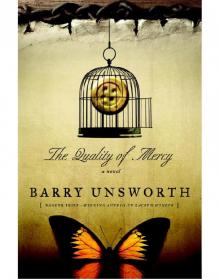 The Quality of Mercy: A Novel
The Quality of Mercy: A Novel The Songs of the Kings: A Novel
The Songs of the Kings: A Novel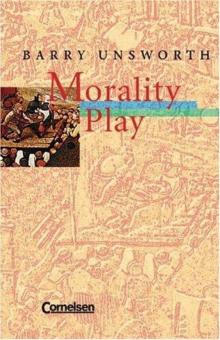 Morality Play. Mit Materialien. (Lernmaterialien)
Morality Play. Mit Materialien. (Lernmaterialien)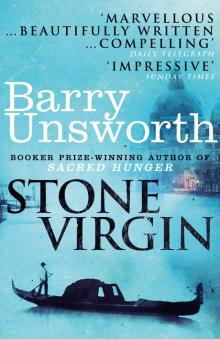 Stone Virgin
Stone Virgin Land of Marvels
Land of Marvels Mooncranker's Gift
Mooncranker's Gift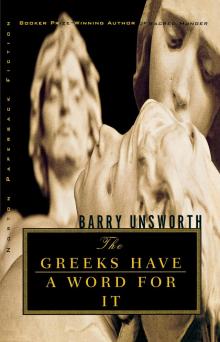 The Greeks Have a Word for It
The Greeks Have a Word for It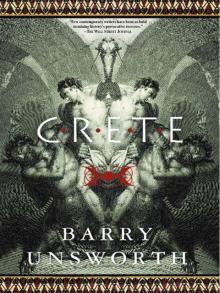 Crete
Crete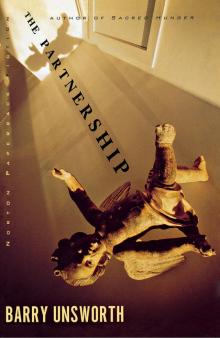 The Partnership
The Partnership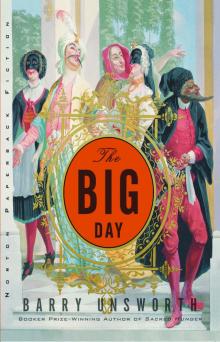 The Big Day
The Big Day The Hide
The Hide Losing Nelson
Losing Nelson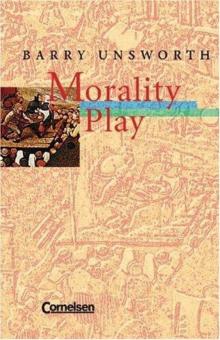 Morality Play
Morality Play Land of Marvels: A Novel
Land of Marvels: A Novel The Ruby In Her Navel
The Ruby In Her Navel